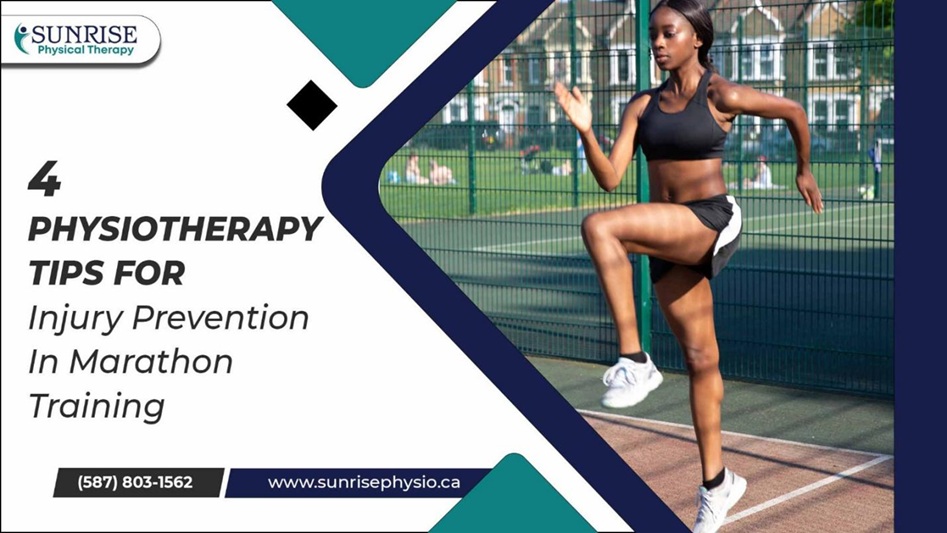The increasing frenzy to run marathons has brought weekend warriors and veteran sprinters tying their shoelaces in record numbers. But with each mile adding up, aches, pains, and avoidable pitfalls multiply. Marathon running is no Sunday stroll—instead, it takes a delicate blend of strength, accuracy, and patience.
Preventing injuries must be at the top of mind while training for a marathon, not an afterthought after being knocked out of commission by shin splints. That’s where Sports Physiotherapy in Spruce Grove comes to the rescue. With science-based knowledge and intelligent assistance, runners can run to the finish line without stumbling off the starting line.
Injury Prevention in Marathon Training
Marathon training conditions the body to the breaking point, meaning injury prevention is an absolute component. Without care, repetitive strain can cause typical setbacks such as shin splints, runner’s knee, or IT band syndrome. Intelligent training is more than putting in the miles—it encompasses strength training, mobility exercise, gait correction, and recovery modalities. All of these pillars decrease the likelihood of overload and enhance overall resilience. Sports physiotherapy in Spruce Grove is critical in detecting red flags early and tailoring prevention strategies. With the appropriate equipment, marathon runners can become more resilient and remain one step ahead of injuries.
How Physiotherapy Can Keep One Safe During Long-Distance Training
Tip #1 – Build a Bulletproof Base: Strength Training Essentials
For runners, it’s crucial to log miles, but building the engine behind the miles is vital. Underdeveloped glutes, underactive quads, or an unstable core can easily turn a training program into a rehab plan. The usual suspects, such as runner’s knee, IT band syndrome, and shin splints, frequently result from muscle imbalances.
Strength training focused on specific areas develops toughness. Make a priority of:
- Hip and glute activation to stabilize the stride.
- Core strength to uphold posture over long distances.
- Quad and hamstring control to dissipate ground reaction forces.
Think of it as building a fortress around the joints—resilience is essential when pushing the body through long, demanding distances.
Physiotherapy Insight: How Muscle Testing Prevents Breakdowns
A physiotherapy evaluation identifies underperforming muscles before they become problematic.
- Muscle testing reveals hidden deficits unseen to the naked eye.
- Runners can be helped with tailored progressive loading programs to enhance function and endurance.
- Strength training can be integrated into the training program without sidelining mileage objectives.
Tip #2 – Mobility Matters: Stretching the Right Way
Stretching is like coffee—it is most effective when consumed correctly and at the correct time. For marathoners, timing is critical.
- Before running, dynamic stretches (consider leg swings and walking lunges) activate muscle groups and increase blood flow.
- Static stretches (such as hamstring holds and calf stretches) after running assist in enhancing flexibility and minimizing stiffness
Tight calves, hamstrings, and hip flexors are the repeat offenders in the long-distance injury hall of shame. Adding mobility to warm-ups and cooldowns can save seconds on race time and lower the risk of injury.
Physiotherapy Insight: Assisted Stretching & Mobility Screening
Physiotherapists can identify mobility limitations and stretch further into the tissues:
- Mobility screens detect constricted areas before they result in overuse.
- Assisted stretching provides improvement in joint range and muscle length.
- Customized home designs guarantee consistency and development.
Tip #3 – Run With Precision: The Role of Running Gait Analysis
Running is a natural motion, but redundant miles with crummy form are a quick ticket to frustration. Inefficient biomechanics such as overstriding, extreme pronation, or heel-pounding foot strike can cause knee discomfort, plantar fasciitis, or lower back complaints.
To limit strain:
- Optimize for efficient cadence (170–180 steps/minute)
- Stand up tall with a modest forward lean
- Land on the foot beneath the body’s center of mass
Attention to form leads to longevity of performance.
Physiotherapy Insight: Personalized Gait Retraining
A running gait analysis records all measurements of a single stride in real time. From this information:
- Physiotherapists recognize asymmetries and impact patterns.
- Exercises are ordered to address mechanical inefficiencies.
- Shoe suggestions and retraining exercises are tailored to every runner.
Tip #4 – Recovery Is a Training Tool: Don’t Skip It
Each run is a microbattle for the muscles. Without smart recovery, inflammation hangs around and gains momentum. Missing rest days doesn’t make runners tougher—it undermines their foundation.
To recover wisely:
- Prioritize 7–9 hours of sleep for hormone regulation and tissue repair.
- Stay hydrated to aid cellular recovery.
- Employ active recovery days (walking, swimming, light mobility work) to wash away fatigue.
Training doesn’t stop at the finish line—it carries on through recovery.
Physiotherapy Insight: Using Modalities to Accelerate Healing
Recovery is where physiotherapy truly shines. Clinics support healing with:
- Manual therapies like massage, cupping, or dry needling to release tight spots
- Electrotherapy to reduce inflammation
- Integration of guided recovery sessions into training cycles
Integrating Physiotherapy Techniques Into a Training Plan
Marathon training isn’t so much about mileage—it’s about upkeep. Including physiotherapy in the regimen prevents injuries before they occur. From functional movement screening and manual therapy to individualized exercise prescriptions, physiotherapy aids every step of the training cycle.
These methods enhance mobility, reinforce weak links, and improve running mechanics, giving runners a better chance of consistency and progress. Preventative physiotherapy for runners is not just for post-injury treatment; it’s a logical, forward-looking approach for long-distance runners who want to train effectively. Clinics offering sports therapy services are key in preventing runner injuries and supporting long-term performance.
Go the Distance with Fewer Setbacks
Marathon running is very stressful for the body, exposing one to injuries such as IT band syndrome, runner’s knee, and shin splints. Injury prevention is crucial, and it is not just limited to mileage but also involves strength training, mobility, gait correction, and recovery. These interventions reduce stress on muscles and joints, preventing overuse injuries.
Sports physiotherapy in Spruce Grove is critical in identifying potential weaknesses and giving personalized prevention programs. Sunrise Physical Therapy offers dedicated services to keep runners running, reducing the risk of injury and maximizing performance. Take action now to prevent injuries and enhance marathon training results.


